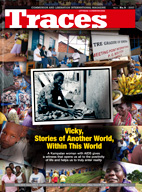
Traces N.9, October 2007
Looking Together at Concrete ExamplesThere is something odd about the fuss surrounding political vacillations. It is not the confusion–that has been a constant fact for some time. The strangeness lies elsewhere and, in order to address it, we need to dig down well below all the schemes and proposed changes–from Conservatives, from Liberals, from the anti-war faction, and so on.
The factor , common to all, lurking below the surface is called desire. This has to do with entreaty and hope–things that politics finds so hard to sustain; things that anti-politics ends up transforming into disquiet, skepticism, and finally anger; things that, however, no power can extirpate from the human heart.
Even in the chaos of a “bewildered country”–to quote the effective term used by Archbishop Bagnasco, President of the Italian Bishops’ Conference–even in the fragmentation and bewilderment that threaten “the unity of the person,” at the origin of politics there is a factor that is mysteriously pulsating. It could be defined as “the religious sense.” In other words, “that dynamic element that through the fundamental questions and needs in which it finds expression, guides personal and social human expression” (Luigi Giussani). And the needs are those of everyone–truth, justice, and happiness.
So we have to start over from the religious sense, or the heart.
We have to take care, though, because the risk is that amongst the many just and legitimate questions to which the politicians are unable to respond, we end up expecting from politics what politics cannot give: complete human fulfillment. This would be a tragic error. Salvation will not come from a party produced by words–even if they are noble words like “democracy” or “freedom”–and even less from words that stir up the streets and favor cynicism. There is no way out that doesn’t start off from the patient, daily recognition that beyond all the selfish interests and exasperated reactions there is still something greater for which it is worth struggling and risking, something that gives us that “sense of common belonging that makes us feel ‘society’” (Archbishop Bagnasco), a desire for good that is for all–the well-known “common good.”
If there is a difference between the past and now it is precisely this. Back then, all this was evident; people were born and grew up in a climate that took it for granted. As time passed, it got less and less. Now, it is no more. In order to recognize it, we have to move forward and someone has to remind us of the way. It takes education.
Above all, we have to look together at concrete examples, already in action–works with names, histories, and (at times) even trademarks–that start off from the religious sense and have the good of all at heart. We need to look at works that do not offer total solutions to the problems, but offer to people–all the people–the conditions needed to look for them, in freedom.
The first task of politicians is to support this education, to look for these examples and cultivate them, make them live and expand. It is an almost ascetic task, because there will always be the temptation to suffocate them, reducing them to tools of power, or mixing them up in the heap of things to be thrown away. It is a dramatic task, because it appeals to the politician’s freedom, even freedom from his own party.
If education is a risk, then politics is just as much a risk. We are with those who still want to run this risk.